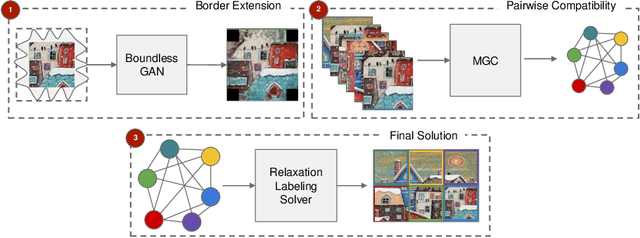Marina Khoroshiltseva
Re-assembling the past: The RePAIR dataset and benchmark for real world 2D and 3D puzzle solving
Oct 31, 2024



Abstract:This paper proposes the RePAIR dataset that represents a challenging benchmark to test modern computational and data driven methods for puzzle-solving and reassembly tasks. Our dataset has unique properties that are uncommon to current benchmarks for 2D and 3D puzzle solving. The fragments and fractures are realistic, caused by a collapse of a fresco during a World War II bombing at the Pompeii archaeological park. The fragments are also eroded and have missing pieces with irregular shapes and different dimensions, challenging further the reassembly algorithms. The dataset is multi-modal providing high resolution images with characteristic pictorial elements, detailed 3D scans of the fragments and meta-data annotated by the archaeologists. Ground truth has been generated through several years of unceasing fieldwork, including the excavation and cleaning of each fragment, followed by manual puzzle solving by archaeologists of a subset of approx. 1000 pieces among the 16000 available. After digitizing all the fragments in 3D, a benchmark was prepared to challenge current reassembly and puzzle-solving methods that often solve more simplistic synthetic scenarios. The tested baselines show that there clearly exists a gap to fill in solving this computationally complex problem.
Nash Meets Wertheimer: Using Good Continuation in Jigsaw Puzzles
Oct 22, 2024



Abstract:Jigsaw puzzle solving is a challenging task for computer vision since it requires high-level spatial and semantic reasoning. To solve the problem, existing approaches invariably use color and/or shape information but in many real-world scenarios, such as in archaeological fresco reconstruction, this kind of clues is often unreliable due to severe physical and pictorial deterioration of the individual fragments. This makes state-of-the-art approaches entirely unusable in practice. On the other hand, in such cases, simple geometrical patterns such as lines or curves offer a powerful yet unexplored clue. In an attempt to fill in this gap, in this paper we introduce a new challenging version of the puzzle solving problem in which one deliberately ignores conventional color and shape features and relies solely on the presence of linear geometrical patterns. The reconstruction process is then only driven by one of the most fundamental principles of Gestalt perceptual organization, namely Wertheimer's {\em law of good continuation}. In order to tackle this problem, we formulate the puzzle solving problem as the problem of finding a Nash equilibrium of a (noncooperative) multiplayer game and use classical multi-population replicator dynamics to solve it. The proposed approach is general and allows us to deal with pieces of arbitrary shape, size and orientation. We evaluate our approach on both synthetic and real-world data and compare it with state-of-the-art algorithms. The results show the intrinsic complexity of our purely line-based puzzle problem as well as the relative effectiveness of our game-theoretic formulation.
* to be published in ACCV2024
Multi-Phase Relaxation Labeling for Square Jigsaw Puzzle Solving
Mar 26, 2023Abstract:We present a novel method for solving square jigsaw puzzles based on global optimization. The method is fully automatic, assumes no prior information, and can handle puzzles with known or unknown piece orientation. At the core of the optimization process is nonlinear relaxation labeling, a well-founded approach for deducing global solutions from local constraints, but unlike the classical scheme here we propose a multi-phase approach that guarantees convergence to feasible puzzle solutions. Next to the algorithmic novelty, we also present a new compatibility function for the quantification of the affinity between adjacent puzzle pieces. Competitive results and the advantage of the multi-phase approach are demonstrated on standard datasets.
* 10 pages, 7 figures. Published in Proceedings of the 18th International Joint Conference on Computer Vision, Imaging and Computer Graphics Theory and Applications - Volume 4 VISAPP: VISAPP, 785-795, 2023
Relaxation Labeling Meets GANs: Solving Jigsaw Puzzles with Missing Borders
Mar 28, 2022



Abstract:This paper proposes JiGAN, a GAN-based method for solving Jigsaw puzzles with eroded or missing borders. Missing borders is a common real-world situation, for example, when dealing with the reconstruction of broken artifacts or ruined frescoes. In this particular condition, the puzzle's pieces do not align perfectly due to the borders' gaps; in this situation, the patches' direct match is unfeasible due to the lack of color and line continuations. JiGAN, is a two-steps procedure that tackles this issue: first, we repair the eroded borders with a GAN-based image extension model and measure the alignment affinity between pieces; then, we solve the puzzle with the relaxation labeling algorithm to enforce consistency in pieces positioning, hence, reconstructing the puzzle. We test the method on a large dataset of small puzzles and on three commonly used benchmark datasets to demonstrate the feasibility of the proposed approach.
 Add to Chrome
Add to Chrome Add to Firefox
Add to Firefox Add to Edge
Add to Edge